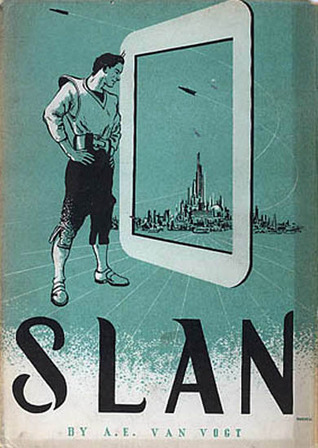Vintage Science Fiction Month is the brainchild of the Little Red Reviewer. The objective: Read and discuss “older than I am” Science Fiction in the month of January.
Not long after Superman made his debut in the pages of Action Comics in 1938, A.E. van Vogt was pitching a more scientific version of the idea to John Campbell, the infamous editor of Astounding magazine (the resultant novel Slan would be serialized in that magazine in 1940). van Vogt had already been exploring the idea that humans would need to transcend themselves in order to better explore the universe. He proposed a novel wherein a new species of Homo Superior emerges out of humans as we presently know them. Because van Vogt proposed that the story be told from the perspective of the new, higher order being, Campbell initially rejected the idea. His main point was that you couldn’t tell a superman story from the superman’s viewpoint… unless you were a superman yourself!
In what Campbell would later describe as a “beautiful trick”, van Vogt’s solution to this conundrum was to tell the story from the point of view of an isolated, immature superman who had not yet come into his full powers. As Slan begins, nine-year old Jommy Cross has just seen his mother captured and killed. Young, vulnerable, and on the run, he spends the rest of the novel seeking to learn more about himself and his kind.
Slans are the next phase in human evolution, named after their creator, one Samuel Lann. They are stronger, faster, and more intelligent than their human counterparts, and even exhibit fantastic psychic powers, including the ability to read minds. Humans, lead by the dictator Kier Gray, are fearful of slans and plotting ways to exterminate the entire population.
I won’t get into more specific plot points because part of the joy of this novel is the way in which van Vogt continually recontextualizes information that has been laid out earlier in the story. He accomplishes this through a tightly connected series of episodic conversations. Sure, there are the occasional action setpieces involving daring escapes, spaceships, and secret passages, but the real fireworks are in the scheming battles of wits between various characters. Whether it be young Jommy Cross guardedly interrogating a suspected fellow slan or dictator Kier Gray fending off political foes, these conversations constitute the bulk of the novel.
I certainly wouldn’t characterize van Vogt as a tremendous prose stylist, but he does have a tendency to employ a dreamlike vagueness in the way he constructs his sentences. This sometimes comes off as a clumsy turn of phrase, but it can also provoke a creative response if you get on its wavelength. So the story initially appears to have a lot of open questions or silly elements, but there is an almost mystical method to this madness, such that the nitpicking parts of my brain tended to be overcome by the more imaginative impulses that a good story can induce. A steady stream of twists and turns coming at a rather fast pace also doesn’t hurt… Not everything works perfectly (I’m thinking of a particularly abrupt death that, while certainly surprising, also felt a bit cheap – especially at the very end when you get those final couple twists that call back to this moment), but it puts on a good show.
One recurring motif that occurs several times throughout the novel is the scene of mutual recognition. When Jommy finally meets a fellow Slan and they both experience a simultaneous rush of discovery, it’s quite well done (there are several similar sequences throughout the book). This apparently struck a nerve with early fandom, with people jokingly referring to their communal living spaces as “slan shacks” and developing the slogan that “fans are slans!” Again, this was more of a joke than anything else, but it does bely early fandom’s comradery, pleasure at discovering a fellow fan of SF, and willingness to aspire to something more (i.e. slanhood!)
Reading this novel 80 years later, I’d say that it’s a fairly representative example of what made Golden Age science fiction so popular. Lots of ideas and twists, awkward prose that nevertheless possesses a deceptively clever underpinning, short and sweet. It is not a perfect novel, but it is interesting that as a novel about the the next stage of evolution amongst humans, it’s also a clear step forward for the science fiction genre. I enjoyed catching up with it…
